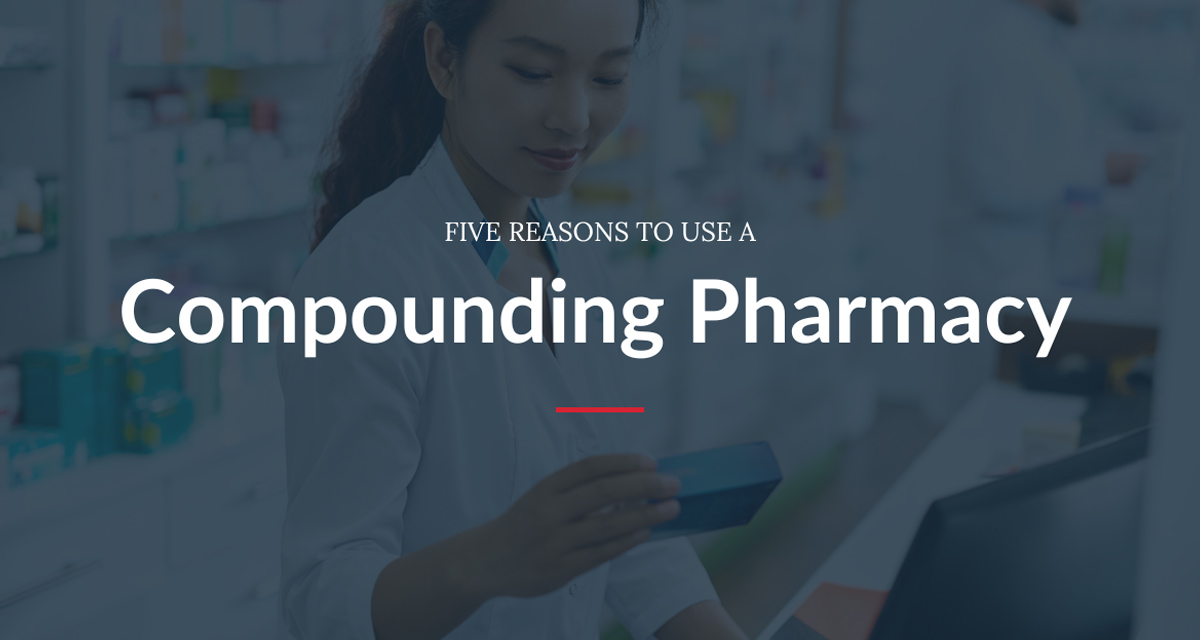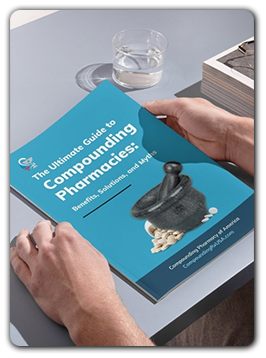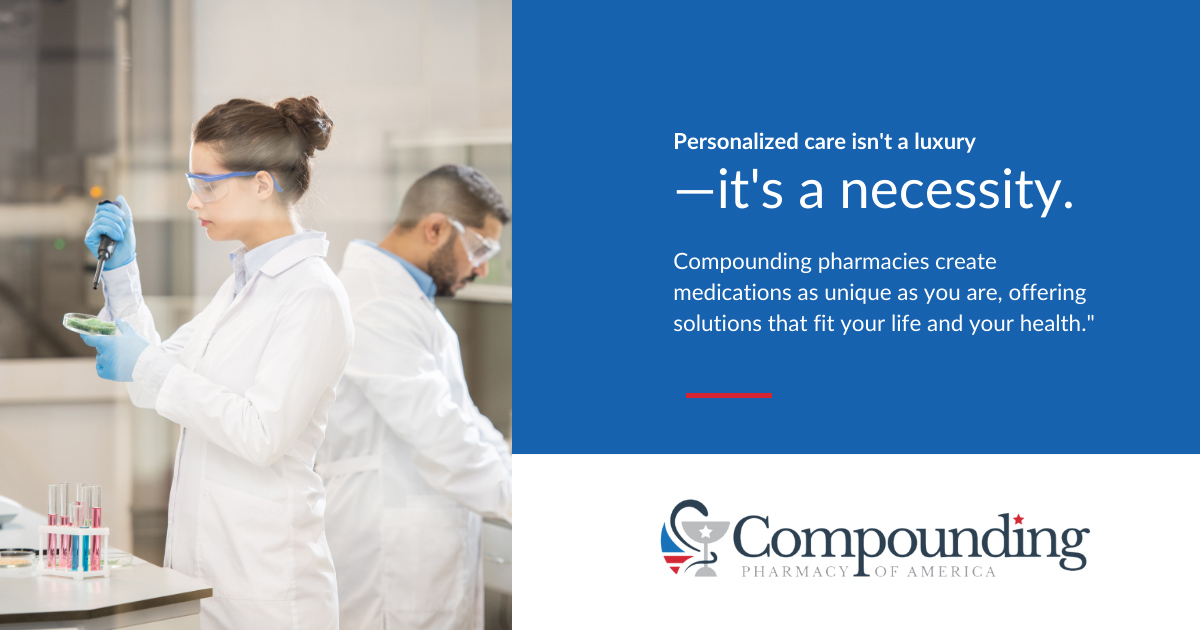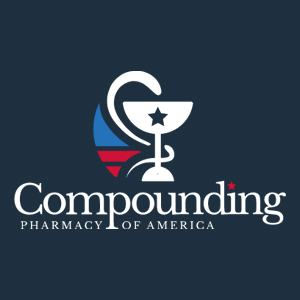
Compounding pharmacies play an essential role in modern healthcare, offering solutions that mass-produced medications often cannot. By personalizing medications to fit unique patient needs, compounding pharmacies bridge gaps in the pharmaceutical landscape. Whether addressing allergies, creating specialized dosages, or offering medications in unavailable forms, the benefits of compounding pharmacies are vast.
Here are five compelling reasons to choose a compounding pharmacy for personalized care.
1. Personalized Medications for Unique Needs
One of the standout advantages of compounding is its ability to tailor medications to specific requirements. Unlike standard pharmacy solutions, compounded medications are custom-made to suit an individual’s unique medical and lifestyle needs. This personalized approach ensures patients receive treatments that are both effective and convenient.
Customized Dosages
Patients with unique health concerns, such as children, seniors, or those with rare conditions, often struggle with medications in standard dosages. Commercially manufactured drugs are typically produced in fixed strengths, leaving little flexibility for adjusting to individual needs. Compounding pharmacists can tailor the dosage to precise specifications, whether that means creating a lower-strength pill for a pediatric patient or dividing an adult dose into smaller, easily managed units for someone sensitive to higher strengths.
For instance, a cancer patient undergoing chemotherapy may require an adjusted dosage to minimize side effects, while still receiving the necessary therapeutic effect. Compounding allows for this flexibility, improving the overall treatment experience.
Child-Friendly Medications

Children are notoriously difficult to medicate, often refusing due to the unpleasant taste, size, or texture of standard medications. Compounding pharmacists offer creative solutions to make medication time less of a battle. By adding flavoring agents, like bubblegum or strawberry, bitter medications can become far more palatable for younger patients.
Ultimate Guide to Compounding Pharmacies -
Download Your Free Copy Today!
Ready to explore the benefits of compounding pharmacies? Get your free copy of The Ultimate Guide to Compounding Pharmacies by adding your email address below and discover how personalized medications can transform your health journey. Learn More
"*" indicates required fields
Your Privacy is important to us

Additionally, compounding pharmacies can transform hard-to-swallow pills into liquids, dissolvable tablets, or even gummy forms. For example, antibiotics for children can be turned into a sweet, flavored syrup that encourages compliance and ensures the treatment plan is followed properly.
Solutions for Seniors
Older adults often face challenges with medications, such as swallowing difficulties, sensitivities to fillers, or polypharmacy issues (taking multiple medications simultaneously). Compounding can address these problems by creating alternative dosage forms like creams, gels, or lozenges that bypass the need to swallow.
Moreover, for seniors managing multiple prescriptions, a compounding pharmacist can combine medications into a single dose. For instance, a patient managing diabetes and high blood pressure could receive a compounded medication that combines their treatments, simplifying their regimen and reducing the risk of missed doses.
Rare Conditions and Niche Needs
Patients with rare diseases or unusual medical needs often struggle to find suitable medications in the commercial market. Compounding pharmacies provide a lifeline by formulating treatments that aren’t available off-the-shelf. For example, a patient with an extremely rare enzyme deficiency may require a specific compound to manage their condition effectively.
2. Solutions for Allergies and Sensitivities
For many patients, the inactive ingredients in commercially available medications—such as dyes, gluten, preservatives, or lactose—can trigger allergic reactions or intolerances. Compounding pharmacies solve this issue by eliminating unnecessary additives and creating medications that are as safe as they are effective.
Allergen-Free Medications
Patients with specific allergies often struggle to find commercially available drugs that meet their needs. Compounding pharmacists can exclude problematic ingredients, ensuring medications are free from allergens like gluten, dairy, or artificial dyes. For example, a patient with celiac disease who reacts to gluten in tablet fillers can receive a compounded version of their medication, crafted without this ingredient.
This customization extends to liquid medications as well. Many commercial suspensions contain preservatives or sweeteners that can irritate sensitive individuals. A compounding pharmacist can create a preservative-free or naturally sweetened version to suit the patient’s needs.
Custom Substitutions for Sensitivities
In some cases, a patient may be allergic to an active ingredient but able to tolerate an alternative compound with a similar therapeutic effect. For example, a patient who experiences side effects from a specific anti-inflammatory drug might benefit from a compounded formula using a safer or gentler alternative.
Case Example: Sensitive Skin Treatments

Allergies and sensitivities aren’t limited to oral medications. Topical treatments like creams, ointments, or gels often contain fragrances, parabens, or preservatives that can cause irritation or rashes. A compounding pharmacy can create hypoallergenic skincare products tailored to the patient’s condition.
For instance, a patient with eczema might require a cream free of common irritants but fortified with soothing agents like aloe vera or colloidal oatmeal. Compounding ensures the patient’s skin receives the relief it needs without additional irritation.
Addressing Pediatric and Geriatric Needs
Children and seniors are particularly prone to sensitivities due to their developing or aging systems. Compounding pharmacies can create gentler formulations tailored to these vulnerable groups. A pediatric patient requiring a lactose-free antibiotic suspension, or a senior with a dye allergy needing an alternative blood pressure medication, can rely on compounding for a safe solution.
Real-World Impact
Studies show that allergies to inactive ingredients in medications can lead to poor compliance and adverse health outcomes. By eliminating these barriers, compounding pharmacies help patients adhere to their treatment plans without the fear of reactions or side effects. This level of customization provides a safer, more comfortable experience for patients of all ages.
3. Access to Discontinued or Hard-to-Find Medications
The pharmaceutical industry often leaves gaps in patient care due to medication discontinuation, manufacturing shortages, or lack of availability for niche conditions. For patients relying on such treatments, compounding pharmacies offer a vital solution, recreating or customizing medications to ensure continuity of care.
Recreating Discontinued Medications
Manufacturers may discontinue medications for a variety of reasons, such as low demand or shifting priorities in drug development. However, for patients who rely on these drugs, the loss can be devastating. Compounding pharmacies can replicate discontinued medications by sourcing pharmaceutical-grade ingredients and following the same or similar formulas, ensuring patients don’t lose access to their treatments.
For example, a patient managing hypothyroidism may require a specific formulation of desiccated thyroid that’s no longer commercially available. A compounding pharmacist can recreate this medication, restoring effective treatment.
Addressing Medication Shortages
Drug shortages are another common challenge in the pharmaceutical world. During these periods, patients may face delays in accessing essential treatments, compromising their health. Compounding pharmacies step in by formulating medications during shortages, helping bridge the gap until commercial supplies are restored.
For instance, during a nationwide shortage of injectable pain medications, compounding pharmacies can prepare sterile versions of these drugs in compliance with rigorous safety standards, ensuring critical care for patients in need.
Customizing Hard-to-Find Medications
Some patients require formulations or delivery methods not commonly available in retail pharmacies.
Compounding pharmacists can create these specialized options to meet unique needs, such as:
- Preservative-Free Injections: Ideal for patients with allergies to preservatives.
- Sugar-Free Syrups: Beneficial for diabetic patients who cannot consume medications with added sugars.
- Rare Ophthalmic Solutions: Customized eye drops for specific conditions, such as chronic dry eye or post-surgical recovery.
Veterinary Applications

Compounding pharmacies aren’t limited to human patients. Pet owners often struggle to find appropriate medications for their animals, particularly for exotic pets like birds, reptiles, or rabbits. Compounding offers tailored solutions such as:
- Flavored medications (e.g., chicken-flavored antibiotics for dogs).
- Adjusted dosages for smaller pets.
- Unique delivery forms like chewable treats or topical gels.
Case Study: The Value of Compounding in Rare Conditions
Consider a patient with a rare autoimmune disorder requiring a specific immune suppressant that is no longer manufactured. Without access to this medication, their symptoms could worsen dramatically. A compounding pharmacist can source the active ingredients and prepare the necessary formulation, ensuring the patient receives life-sustaining treatment.
Ensuring Continuity of Care
When medications are discontinued or unavailable, patients often experience significant anxiety about how they will continue their treatment. By filling these gaps, compounding pharmacies offer peace of mind and ensure that critical health needs are met without disruption.
4. Flexibility for Lifestyle and Travel Needs
Modern lifestyles are dynamic, with many patients juggling demanding schedules, frequent travel, or specific personal preferences. Compounding pharmacies excel in providing solutions that adapt to these unique challenges, offering medications tailored to fit seamlessly into patients’ busy lives.
Travel-Friendly Medications
For frequent travelers, managing medication schedules and storage can be daunting.
Compounding pharmacies offer innovative solutions that make travel easier, such as:
- Compact Dosage Forms: Single-use packets, dissolvable tablets, or chewable options are easier to pack and use on the go.
- Heat- or Cold-Stable Formulations: Medications customized to withstand extreme temperatures during travel, particularly important for international trips or outdoor adventures.
- Custom Sleep Aids: Jet lag and disrupted schedules often lead to sleep difficulties. Compounded melatonin or calming supplements can be tailored to address these needs without grogginess.
Fitness and Wellness Solutions
Active individuals, including athletes and fitness enthusiasts, often require specialized medications or supplements to support their health and performance goals.
Compounding pharmacies can create:
- Topical Pain Relievers: Gels or creams for localized pain relief that avoid systemic side effects.
- Custom Electrolyte Solutions: Hydration and recovery drinks tailored to specific nutritional needs.
- Anti-Inflammatory Compounds: Medications designed to reduce muscle soreness and promote faster recovery after intense workouts.
These personalized formulations help athletes and active individuals optimize their performance while minimizing health risks.
Cosmetic and Anti-Aging Applications
Compounding pharmacies also cater to wellness and skincare needs, offering customized cosmetic solutions that address unique dermatological concerns.
Popular examples include:
- Retinoid Creams: Tailored formulations for managing acne or reducing fine lines.
- Pigmentation Serums: Customized blends to address hyperpigmentation or uneven skin tone.
- Anti-Aging Treatments: Personalized serums or creams enriched with antioxidants and peptides to support youthful, healthy skin.
By creating products specific to an individual’s skin type and goals, compounding pharmacies provide a more effective approach to beauty and self-care.
Stress and Sleep Management

Stress and sleep issues are common in today’s fast-paced world. Compounding pharmacies can help by formulating calming supplements, sleep aids, or herbal blends customized to the patient’s needs.
For example:
- Customized Sleep Aids: Combining melatonin with magnesium or chamomile for a balanced, gentle sleep solution.
- Stress Relief Medications: Formulations using ingredients like L-theanine or valerian root to reduce anxiety and promote relaxation.
Managing Digestive Health
Patients with gastrointestinal conditions often face difficulty finding medications that align with their specific needs.
Compounded solutions for gut health can include:
- Probiotics tailored to address imbalances.
- Enzyme replacements for better digestion.
- Medications for conditions like irritable bowel syndrome (IBS) or acid reflux.
Case Example: Personalized Care on the Go
Consider a business traveler managing diabetes who needs insulin that won’t degrade during long-haul flights or extreme climates. A compounding pharmacy can create a formulation designed to remain stable, ensuring the patient’s health is maintained even under challenging conditions.
Improving Quality of Life
The ability to customize medications for unique lifestyles gives compounding pharmacies a distinct advantage. Whether helping a marathon runner recover faster, aiding a world traveler with convenient dosage forms, or supporting a patient’s skin care journey, compounded medications empower individuals to maintain their health and productivity without compromise.
5. Improved Patient Experience and Compliance
Medication adherence is a cornerstone of effective healthcare. However, standard pharmaceutical options often fall short of addressing the unique needs of patients, leading to missed doses, incomplete treatments, or unnecessary side effects. Compounding pharmacies improve the patient experience by creating personalized solutions that make medications easier and more convenient to use, ultimately enhancing compliance and health outcomes.
Simplifying Complex Regimens
Patients with chronic conditions or multiple prescriptions often face complicated medication schedules. This can lead to confusion, missed doses, or even dangerous medication interactions.
Compounding pharmacies simplify these regimens by:
- Combining Multiple Medications into One Dose: For example, a patient managing diabetes and hypertension can receive a single compounded capsule that contains all their prescribed ingredients.
- Adjusting Timing for Convenience: Medications can be formulated for sustained release, allowing for fewer doses throughout the day.
These adjustments reduce the burden on patients and caregivers, making it easier to stick to treatment plans.
Customized Dosage Forms
Many patients struggle with traditional dosage forms like large pills or bitter-tasting liquids.
Compounding pharmacists offer alternatives that improve the overall experience, such as:
- Topical Creams or Gels: Ideal for patients who prefer to avoid oral medications, topical solutions are absorbed through the skin and provide localized or systemic relief.
- Flavored Medications: A lifesaver for pediatric patients, flavoring agents make essential treatments more palatable. Options like bubblegum, cherry, or grape ensure that children are less resistant to taking their medications.
- Liquid Suspensions: For individuals with swallowing difficulties, liquid formulations are easier to consume and adjust for precise dosing.
Solutions for Pediatric Patients
Parents often face significant challenges when administering medications to children. Standard options may be too concentrated, unpalatable, or unavailable in forms that are easy to use.
Compounding pharmacies address these issues by:
- Offering lower-dose formulations tailored to a child’s weight and age.
- Creating fun, flavored medications that transform treatment into a more pleasant experience.
For example, an antibiotic that a child previously refused to take can be reformulated as a sweet, fruit-flavored suspension, improving adherence and recovery outcomes.
Convenience for Caregivers
Caregivers for elderly patients or individuals with disabilities often struggle with the logistics of administering medications.
Compounded solutions streamline the process by:
- Reducing Dosing Frequency: Extended-release medications allow for less frequent dosing, easing the burden on caregivers.
- Simplified Instructions: Clear, patient-specific labels and guidance ensure caregivers feel confident in administering medications.
Addressing Side Effects and Tolerability
Standard medications can sometimes cause uncomfortable side effects that discourage patients from completing their prescribed course.
Compounding pharmacies can reduce these side effects by:
- Removing Irritants: Eliminating dyes, fillers, or preservatives that commonly cause gastrointestinal upset or allergic reactions.
- Adjusting Strengths Gradually: For patients sensitive to high doses, compounding allows for incremental adjustments, ensuring better tolerability over time.
Case Example: Enhancing Compliance for Seniors

An elderly patient managing arthritis and high blood pressure struggles to remember their medication schedule due to cognitive decline. A compounding pharmacy creates a transdermal gel combining their pain reliever and blood pressure medication, reducing the number of pills they need to take each day. This not only simplifies their regimen but also minimizes the risk of missed doses, improving overall health outcomes.
The Impact of Improved Compliance
Studies show that patients who adhere to their prescribed medications are more likely to achieve their health goals and avoid complications. By addressing the barriers to adherence—whether through easier dosage forms, combined medications, or personalized instructions—compounding pharmacies play a pivotal role in supporting long-term wellness.
Why Compounding Pharmacies Are Worth Considering

Compounding pharmacies offer unmatched versatility, personalization, and care in today’s healthcare landscape. Whether addressing allergies, creating travel-friendly solutions, or improving medication compliance, they provide essential alternatives to standard pharmaceutical offerings.
At Compounding Pharmacy of America, we specialize in creating customized solutions that fit your unique needs. From allergy-free formulations to tailored lifestyle medications, our team is dedicated to improving your health through precision and innovation.
Contact us today to learn how our compounding services can enhance your healthcare journey.
Looking for more in-depth information about how compounding pharmacies can transform your healthcare? Download our free eBook, The Ultimate Guide to Compounding Pharmacies, and discover the benefits, solutions, and myths surrounding personalized medications.
*Editor’s Note: This article was medically reviewed for accuracy and updated in December, 2024. Older articles on this topic have been updated and consolidated into this comprehensive guide.

Compounding Pharmacy of America is committed to delivering reliable, accurate, and actionable health information to empower you on your wellness journey. Our content is created and reviewed by a dedicated team of professionals, including experienced writers and licensed healthcare experts.
Learn More About Compounding Pharmacy of America Editorial Team





 Subscribe to Our Newsletter
Subscribe to Our Newsletter
